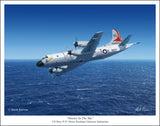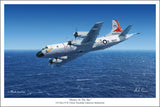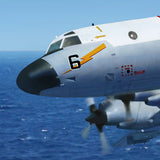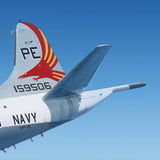Based on the Lockheed L-188 commercial airliner, the P-3 Orion is a turboprop anti-submarine and maritime surveillance aircraft which is operated by the US Navy. Perhaps the most recognizable feature is the distinctive tail boom, used for the magnetic anomaly detection (MAD) of submarines.
The Orion utilizes four Allison T56 turboprops giving it a 473 MPH top speed. The aircraft has an internal bomb bay in the forward section of the fuselage. The Orion can carry conventional Mark 50 or Mark 46 torpedoes or nuclear weapons. It can also carry various missiles and other ordinance on external hard points.
Entering service during the Cold War, the primary mission of the P-3 Orion was to locate and destroy Soviet Navy ballistic missile and fast attack submarines in the event of full-scale war. In the late 1990s and early 2000s, the mission expanded to include battlespace surveillance both at sea and over land.
The P-3 Orion in US Navy service took part during the Cuban Missile Crisis, Vietnam War, The Gulf War in Iraq, Desert Storm, Operation Iraqi Freedom and Afghanistan. During its peak, the U.S. Navy fielded twenty-four active duty "Fleet" patrol squadrons. There were also thirteen Naval Reserve patrol squadrons.
The Orion utilizes four Allison T56 turboprops giving it a 473 MPH top speed. The aircraft has an internal bomb bay in the forward section of the fuselage. The Orion can carry conventional Mark 50 or Mark 46 torpedoes or nuclear weapons. It can also carry various missiles and other ordinance on external hard points.
Entering service during the Cold War, the primary mission of the P-3 Orion was to locate and destroy Soviet Navy ballistic missile and fast attack submarines in the event of full-scale war. In the late 1990s and early 2000s, the mission expanded to include battlespace surveillance both at sea and over land.
The P-3 Orion in US Navy service took part during the Cuban Missile Crisis, Vietnam War, The Gulf War in Iraq, Desert Storm, Operation Iraqi Freedom and Afghanistan. During its peak, the U.S. Navy fielded twenty-four active duty "Fleet" patrol squadrons. There were also thirteen Naval Reserve patrol squadrons.








